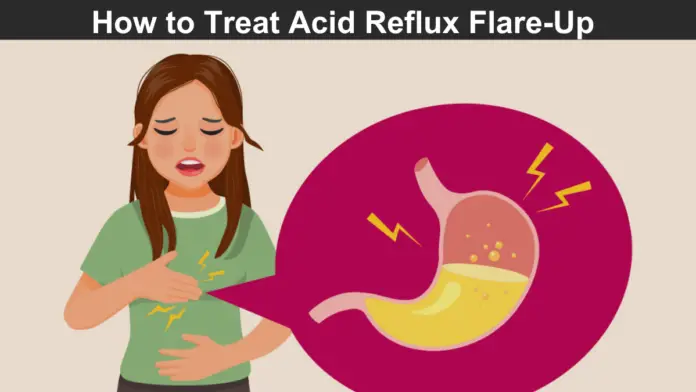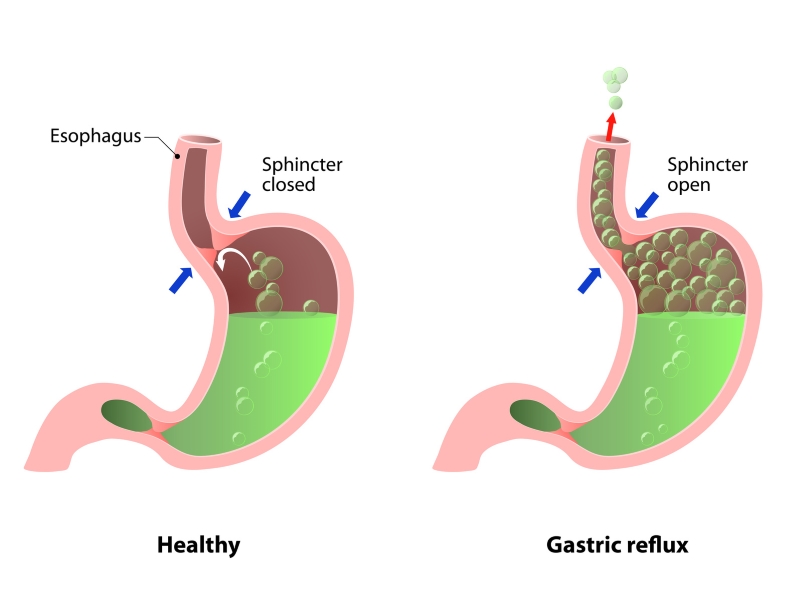
Acid Reflux, medically known as Gastroesophageal Reflux Disease (GERD), is a common condition that affects millions of people worldwide. It is characterized by the upward flow of stomach acid into the esophagus, causing a myriad of distressing symptoms such as heartburn, chest pain, and a sour taste in the mouth.
A flare-up, in the context of this condition, refers to the sudden and intense onset of these symptoms. It’s more than just an annoyance – it can disrupt daily activities, impair sleep quality, and even lead to serious complications if not managed effectively. Understanding how to treat an acid reflux flare-up is crucial to regaining control over your health and improving your quality of life.
What is Acid Reflux?

Acid reflux, often known as GERD, is a gastrointestinal disorder that occurs when stomach acid or bile flows into the food pipe and irritates the lining of the esophagus. This phenomenon is commonly felt as heartburn – a burning sensation in the chest, close to the heart.
Causes of Acid Reflux
There are several factors that can cause acid reflux, some of which include:
- Obesity: Excessive weight puts pressure on the abdomen, pushing up the stomach and causing acid to flow back into the esophagus.
- Hiatal Hernia: This condition occurs when the upper part of the stomach bulges through the large muscle separating your abdomen and chest, leading to acid reflux.
- Pregnancy: Due to hormonal changes and pressure from the growing fetus, pregnant women often experience acid reflux.
Triggers of Acid Reflux Flare-Ups
Certain foods and lifestyle habits can trigger an acid reflux flare-up. Here are a few common triggers:
| Food Triggers | Lifestyle Triggers |
| Fried or fatty foods | Smoking |
| Tomato-based foods | Lack of physical exercise |
| Chocolate | Stress and lack of sleep |
| Alcoholic beverages | Overeating |
| Caffeinated drinks | Wearing tight clothes |
| Citrus fruits | Lying down or sleeping soon after eating |
Understanding these causes and triggers is the first step in learning how to treat acid reflux flare-ups. The next sections will delve deeper into treatment strategies and preventive measures.
Symptoms of Acid Reflux Flare-Up
Acid reflux flare-ups can present with a range of symptoms. Some of these can be quite mild, while others might be severe enough to interfere with daily activities. Here are the most commonly reported symptoms:
1. Heartburn
The most distinctive and well-known symptom of an acid reflux flare-up is heartburn. This is described as a burning sensation that starts in the stomach and moves up toward the chest and throat.
2. Regurgitation
Regurgitation, or the sensation of acid backing up into the throat or mouth, is another common symptom. This can produce a sour or bitter taste and may also lead to a ‘wet burp’ or even vomiting.
3. Dyspepsia
Dyspepsia, or indigestion, often accompanies an acid reflux flare-up. Symptoms of dyspepsia include stomach discomfort, feeling full too quickly while eating, and excessive burping.
4. Sore Throat and Hoarseness
Acid reflux can irritate the throat, causing symptoms such as sore throat, hoarseness in the voice, or a feeling of a lump in the throat.
5. Chronic Cough and Breathing Difficulties
In some cases, an acid reflux flare-up might lead to persistent coughing or breathing difficulties, such as shortness of breath or wheezing.
Knowing these symptoms is crucial in understanding how to treat an acid reflux flare-up. Let’s now move on to discuss various treatment strategies and preventive measures.
How to Treat Acid Reflux Flare-Up
1. Over-the-Counter Treatments
Over-the-counter medications can be effective for managing acid reflux flare-ups. These include:
- Antacids: These neutralize stomach acid and can provide quick relief. Common options include Tums, Rolaids, and Maalox.
- H2 Blockers: They reduce the production of stomach acid. These include options such as Pepcid AC and Zantac.
- Proton pump inhibitors (PPIs): These drugs block acid production and allow time for damaged esophageal tissue to heal. Prilosec and Prevacid are commonly used PPIs.
Remember, these medications should be used as directed by the manufacturer or your healthcare provider.
2. Prescription Medications
If over-the-counter treatments aren’t effective, your doctor may prescribe stronger medications. These may include prescription-strength versions of H2 blockers or PPIs. In severe cases, prokinetic drugs may be prescribed to help the stomach empty more quickly and prevent acid from backing up into the esophagus.
3. Lifestyle Changes and Home Remedies
Making certain lifestyle changes can also help treat and prevent acid reflux flare-ups:
- Maintain a Healthy Weight: Excess pounds put pressure on the abdomen and can trigger acid reflux.
- Watch What You Eat: Foods and drinks like alcohol, caffeine, chocolate, and fatty or spicy foods can trigger acid reflux. Avoid these where possible.
- Quit Smoking: Smoking decreases the ability of the lower esophageal sphincter to function properly, leading to acid reflux.
- Elevate the Head of Your Bed: Raising the head of your bed by 6 inches can prevent stomach acid from backing up into the esophagus while you sleep.
- Avoid Lying Down After Eating: Wait at least three hours after eating before lying down or going to bed.
Incorporating these treatments and lifestyle changes can help alleviate an acid reflux flare-up. If symptoms persist, ensure to consult with a healthcare provider.
Prevention of Acid Reflux Flare-Up
Preventing an acid reflux flare-up is largely a matter of maintaining a healthy lifestyle and diet, along with regular medical check-ups. Here are some steps you can take:
1. Dietary Modifications
The food you consume plays a critical role in managing acid reflux:
- Avoid Trigger Foods: This includes spicy foods, caffeine, alcohol, and high fatty content foods.
- Eat Smaller Meals: Rather than three large meals, try five smaller meals to prevent your stomach from becoming too full and causing acid reflux.
- Stay Hydrated: Water neutralizes stomach acid and aids digestion.
2. Beneficial Habits to Adopt
Adopting the following lifestyle changes can also help in preventing an acid reflux flare-up:
- Regular Exercise: Regular physical activity can help maintain a healthy body weight, reducing your risk of acid reflux.
- Quit Smoking: Tobacco can relax the lower esophageal sphincter and increase the risk of acid reflux.
- Proper Posture: Avoid reclining or lying down immediately after eating to prevent acid reflux.
3. Importance of Regular Medical Check-ups
Regular medical check-ups can help your doctor track your symptoms and adjust treatment plans as necessary. This can be crucial in preventing acid reflux flare-ups.
By following these dietary modifications and lifestyle habits, along with regular medical check-ups, one can effectively prevent acid reflux flare-ups.
Frequently Asked Questions (FAQs)
What triggers an acid reflux flare-up?
An acid reflux flare-up can be triggered by several factors including consumption of certain foods such as spicy foods, alcohol, caffeine, and foods with high fatty content. Other triggers include smoking, obesity, lying down or reclining immediately after eating, and certain medications.
How long does an acid reflux flare-up last?
The duration of an acid reflux flare-up can vary from person to person, and may last anywhere from a few minutes to several hours. However, if symptoms persist for more than a week despite lifestyle modifications and over-the-counter medication, seek medical attention.
Can stress cause an acid reflux flare-up?
Yes, stress can indeed exacerbate acid reflux symptoms. Chronic stress can lead to behaviors like overeating or smoking which indirectly contribute to acid reflux. It may also cause a direct increase in stomach acid production.
Are there any home remedies to treat an acid reflux flare-up?
Simple lifestyle changes are often the best home remedies to manage acid reflux. These include dietary modifications, regular exercise, maintaining a healthy weight, and quitting smoking. Over-the-counter antacids or medications that reduce acid production can also provide relief.
Can acid reflux be cured completely?
While there’s no cure for acid reflux, it can be effectively managed with lifestyle changes and medication. Regular medical check-ups can help your doctor monitor your symptoms and adjust your treatment plan as necessary.
Conclusion
In summary, managing an acid reflux flare-up involves understanding your triggers and making appropriate lifestyle modifications. Diet plays a significant role, and avoiding common triggers such as spicy foods, caffeine, and high-fat foods can make a big difference. Stress is also a notable factor, and managing stress through techniques like meditation or exercise can help control symptoms. Home remedies, such as regular physical activity, maintaining a healthy weight, and quitting smoking, can provide substantial relief. While there is no complete cure for acid reflux, it can be effectively controlled with the right measures and medical advice.
Don’t let acid reflux rule your life. You have the power to take control of your health and well-being, and with a few modifications, you can successfully manage your symptoms. Always consult a healthcare provider if symptoms persist. Stay proactive, keep informed, and remember – your health is in your hands.











